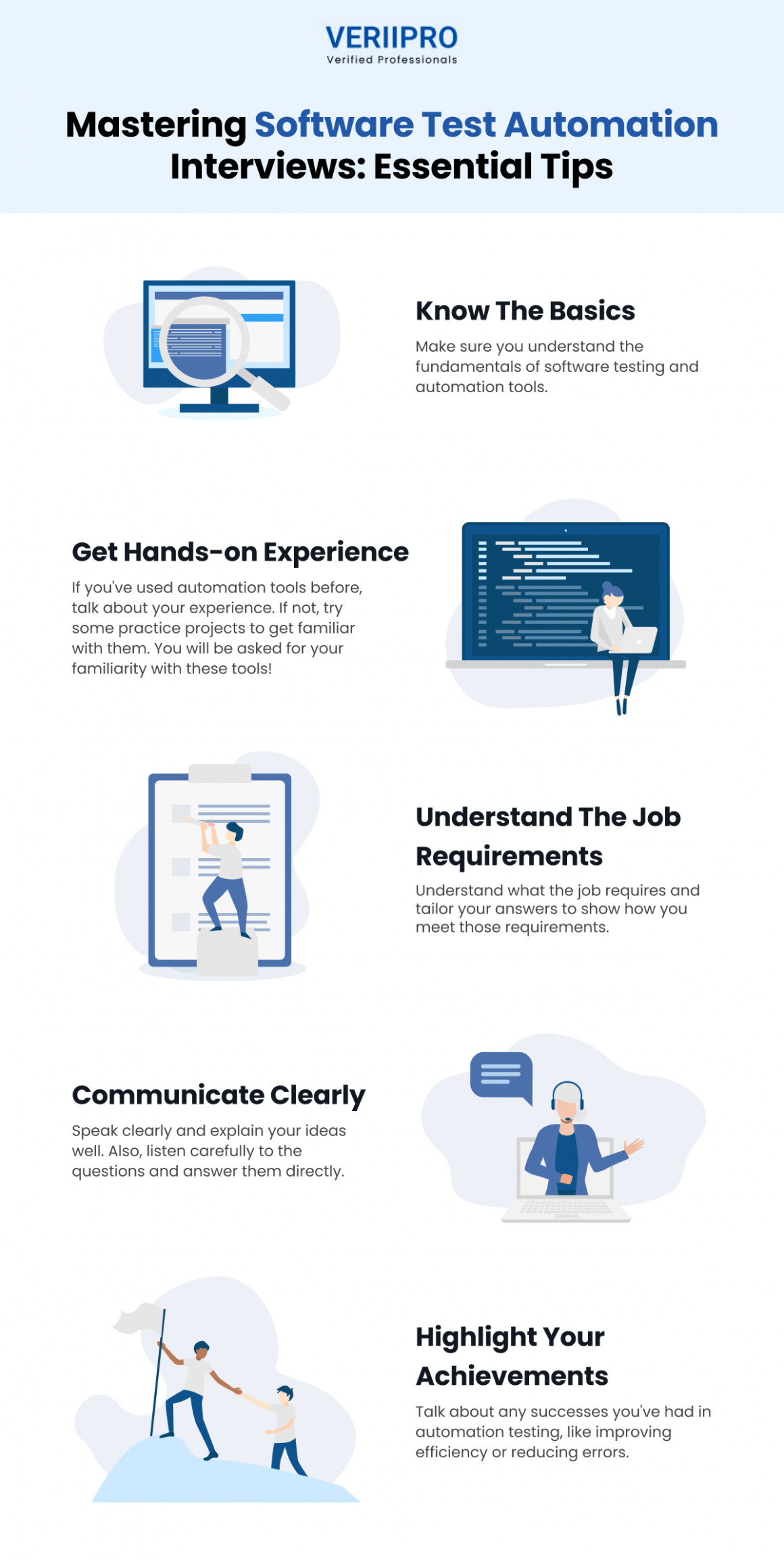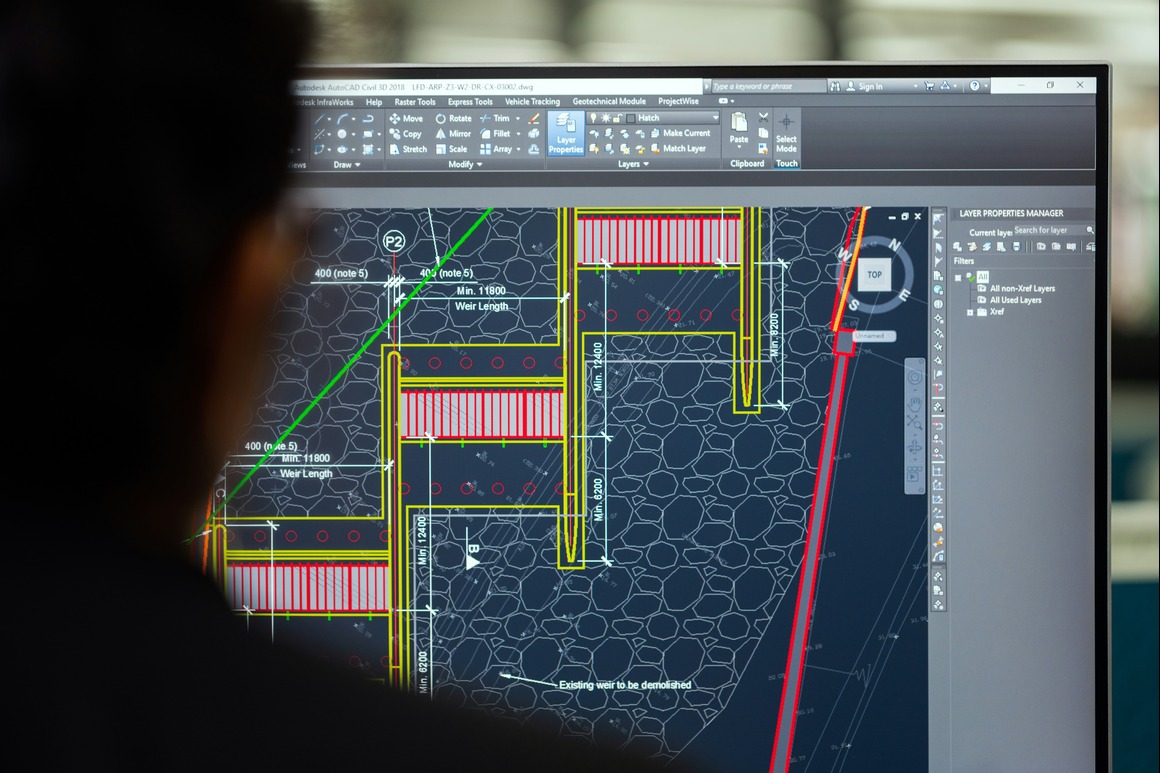A Guide to Software Test Automation Interviews
In the world of software testing, things are changing rapidly. One big change is the rise of Automation Testing. This means using special tools and programs to test software automatically instead of doing it all manually. In fact, the market for software testing was worth $45 billion in 2022 and is expected to keep growing at a rate of 5% every year from 2023 to 2032 thanks to the growing use of mobile apps.
With automation testing becoming more popular, companies need skilled automation testers more than ever. This has led to a huge demand for these experts, which means competition for jobs is tough!
So, when you’re gearing up for a job interview as an automation tester in 2024, you’re not just expected to know your way around fancy testing tools, you’ve got to show off your problem-solving skills, understand the basics of testing, and maybe even crack a few tricky questions along the way.
That’s where VeriiPro comes in. We’re like your helpful guide, offering lots of useful resources for IT professionals like you. With VeriiPro, you can find plenty of job listings and get helpful tips for preparing for software test automation interview questions.
Let’s get started!
Essential Software Test Automation Interview Questions
Here’s a crisp compilation of software test automation interview questions for freshers, along with expected answers. It’s your key to cracking that interview and landing your dream job!
1. What is automation testing?
Automation testing is when we use special tools to run tests automatically. The main goal is to reduce how many tests we have to do manually, but it doesn’t get rid of manual testing altogether.
2. What are the ideal conditions for automating a test?
A test is worth automating under the following circumstances:
- The test can be repeated.
- The tested feature’s behavior stays consistent.
- Manual testing is time-consuming.
- The test involves complex computations.
- It checks that new changes didn’t break existing functionality.
3. When should you avoid using automated testing?
There are a few cases where human testers are better suited for software testing:
- If the software changes often, automated tests need frequent updates to stay relevant and may become outdated quickly.
- Exploratory testing, where testers explore software thoroughly, is best done by humans.
- Automated tests may not catch user interface (UI) issues unless they’re specifically designed for that purpose.
4. What is automated regression testing?
Automated regression testing is a method where testers check to make sure that old features still work properly even after new code is added. Its main goal is to confirm that previously tested features continue to function correctly when new changes are made to the software.
5. Should you automate all testing?
Even though automation has its perks, it’s not possible to automate every kind of testing. Certain tests, such as those for user interface, usability, and accessibility, need a human touch and can’t be automated completely.
6. Describe the different components of a test automation framework.
Test automation uses different software tools or frameworks, each with its own features. Here are key features to consider when assessing these tools:
- PROGRAMMABILITY
Some need coding skills, while others don’t, making it easier for non-coders to create tests visually.
- OPEN SOURCE VS. COMMERCIAL
Prices vary, with commercial tools offering support but at a cost, while open-source ones are free but may need more effort for troubleshooting.
- EASE OF USE
Some tools are complex and need training, while others are simple and ready to use.
Common Interview Questions for Automation Testing
Now that we’ve tackled the key interview questions for automation testing often faced by freshers in an interview, let’s dive into a few more commonly asked software automations testing interview questions and answers to help you prepare even further:
1. What are the steps in the automated testing process?
The automated testing process typically consists of five main stages:
- Choosing the primary test tool
- Deciding what to test and how
- Planning, designing, and setting up the automation test strategy and environment
- Writing and running tests
- Reviewing results, reporting findings, and keeping tests up-to-date
Sometimes, setting up the testing environment is a separate step, making it a six-step process.
2. What are the benefits of automated testing?
Automated testing offers many advantages. It allows tests to run faster, covers more areas, and boosts efficiency. Plus, it cuts costs, provides better insights from data, reduces errors caused by humans, and improves the overall quality and performance of applications.
3. What is a test environment?
A test environment is where testing teams run test cases. It’s like a setup that includes hardware and software needed for testing. This setup, also called a test bed, is tailored to fit the requirements of the application being tested. It includes things like systems, applications, test data, databases, browsers, and networks.
4. What is browser automation?
Browser automation is when a computer automatically opens a web application in a browser and performs various tasks without any kind of human intervention.
Getting ready with these questions and answers will really help you in your interview. It boosts your confidence and shows you’re serious about the job. Plus, it helps you see where you need to improve.
So, take the time to prepare these software test engineer interview questions and you’ll be all set to impress!
Tips: Software Automation Testing Interview Questions and Answers
Going through a software automation testing interview might feel daunting, but if you prepare the software test automation interview questions well and approach it the right way, you can boost your chances of doing great.

Along with the list of software tester interview questions, here are some helpful tips to help you excel in your interview:
- Know the basics: Make sure you understand the fundamentals of software testing and automation tools.
- Hands-on experience: If you’ve used automation tools before, talk about your experience. If not, try some practice projects to get familiar with them.
- Understand the job requirements: Understand what the job requires and tailor your answers to show how you meet those requirements.
- Communicate clearly: Speak clearly and explain your ideas well. Also, listen carefully to the questions and answer them directly.
- Highlight your achievements: Talk about any successes you’ve had in automation testing, like improving efficiency or reducing errors.
If you’re ready to take the next step in your software automation testing career then look no further than VeriiPro.
We provide customized job opportunities and expert resources for IT professionals like you.
Start your journey to success today!









